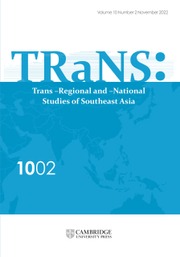Indonesia's Position in Asia: Increasing Soft Power and Connectivity through the 2018 Asian Games
Published online by Cambridge University Press: 14 October 2020
Abstract
Hosting a sports mega-event strengthens connectivity with the world and provides opportunities to establish or increase networks and to build soft power. These events operate as hubs for the global flow of capital, people, knowledge and technology, and they perform important rituals and symbolic functions. In particular, they become coveted opportunities to enrich the soft power portfolio of governments or individual leaders. Despite its regional character, the Asian Games have developed into such a mega-event. In 2018 – only for the second time in the history of the Asian Games – Indonesia staged the event in Jakarta and Palembang. This paper scrutinises the ways in which Indonesia used or failed to use the Asian Games as a platform to increase the country's soft power and reputation and to strengthen intra-Asian connectivity. Three aspects serve as examples to assess Indonesia's soft power initiatives: (1) the “spirit of 1962”, (2) the host country's emergence on the Asian stage and (3) Indonesia's cooperation with other countries and intra-Asia connections in the context of the sports event. Examining the prominence of domestic politics reveals shortcomings and untapped potential. The analysis shows that the inward-looking foreign policy approach of the Jokowi administration limited the initiatives to increase Indonesian soft power and to establish and address Asian themes and debates; consequently, this approach downgraded the sports event to a tool to generate political capital for domestic affairs.
- Type
- Original Article
- Information
- TRaNS: Trans-Regional and -National Studies of Southeast Asia , Volume 9 , Issue 1 , May 2021 , pp. 81 - 97
- Copyright
- Copyright © The Author(s), 2020. Published by Cambridge University Press on behalf of Institute of East Asian Studies, Sogang University.
References
- 2
- Cited by



